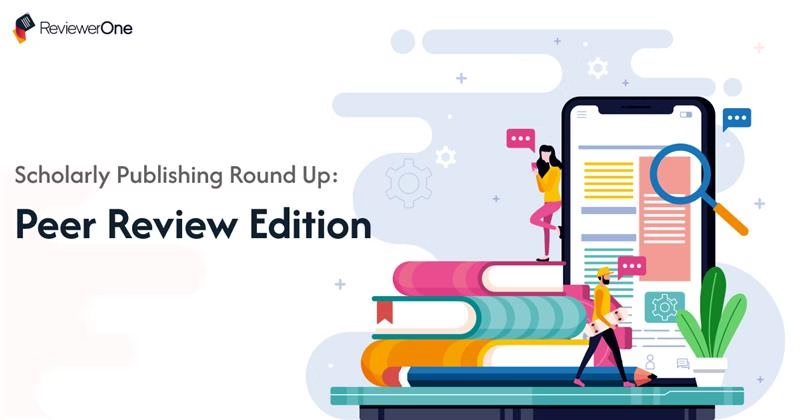This year, during Peer Review Week, the global scholarly publishing community rallied together to talk about Reimagining Peer Review in the AI Era. Peer Review Week 2025 was also preceded by the 10th International Congress on Peer Review and Scientific Publication. The conversations around AI, peer review, ethics, and peer review workflows/efficiencies were louder than ever. We wanted to share a handful of these discussions with you.
Peer review in the age of AI: The good, the bad and ugly
In this blog post, Tim Kersjes, Head of Research Integrity, Resolutions, Springer Nature, shares highlights from the 10th International Congress on Peer Review and Scientific Publication in Chicago. Kersjes shares that several discussions at the Peer Review Congress were on research integrity. He talks about how, while most researchers are ethically comfortable with using AI for writing, few disclose it in their manuscripts (unintentionally or otherwise). He brings up recent surveys showing both support and hesitation: for example, in a survey, 87% of respondents who used AI said it improved writing, but many remain unsure how to talk about it publicly. Unrestricted use of generative AI tools could strip away the human accountability and nuanced critique that peer review demands. There are positives, too. For example, a BMJ study reveals that LLM-generated peer reviews sometimes match or surpass human-written reports in some areas. Kersjes argues for cautious optimism: AI can support reviewers, but clear boundaries and ethical frameworks are essential. Ultimately, peer review process must stay centered on human judgment, even as tech evolves. Read more.
Peer Review Toolkit by the European Association of Science Editors (EASE)
Released during Peer Review Week 2025, EASE’s Peer Review Toolkit brings together a useful set of guides for everyone in scholarly publishing. The toolkit targets a diverse audience: authors and researchers wanting to understand peer review, journal editors looking for ways to select and support reviewers, and reviewers at all experience levels. It includes advice on writing review reports, training materials, tips for publishing reviews, and guidance on ethical practices. This resource pulls from EASE’s own work and trusted industry sources, making it useful for anyone hoping to make peer review more robust and transparent. EASE also invites feedback from the community to keep the toolkit evolving over time. Check out the toolkit.
Open Reviewers Toolkit
This Open Reviewers Toolkit, created by PREreview, offers a suite of free and openly licensed resources crafted for those looking to improve and reflect on their peer review practice. The toolkit stands out with three core components:
- The Bias Reflection Guide: This self-reflection tool helps reviewers recognize and mitigate unconscious bias during manuscript evaluations, providing a non-judgmental framework so reviewers can be more mindful.
- The Reviewer Guide: This provides a step-by-step process for reviewing manuscripts and writing useful, constructive peer review reports.
- The Review Assessment Rubric: This ten-point rubric allows reviewers to score and comment on reports, supporting ongoing improvement in review quality.
All materials are openly available and designed for researchers, editors, and educators keen on training or collaborating around review. Learn more.
Can AI be an editor’s best ally? Rethinking peer review today
This is a recording of a webinar hosted by JAMS (a publishing platform by MDPI), featuring Dr. Enric Sayas and Dr. Oliver Terrett from MDPI along with Dr. Tindaro Cicero, Editor of the journal Publications. The speakers explore how artificial intelligence is reshaping the peer review process. In the context of the theme for Peer Review Week 2025, they discuss whether AI is just another burden for busy reviewers, or whether, if used with care, it can boost efficiency, identify overlooked experts, and rebalance workloads. The key takeaway: AI can open doors, but the community must build in transparency and inclusivity from the start. There is a shared understanding that the future of peer review practices will pair the strengths of technology with the irreplaceable judgment of humans. Watch the recording here.
May the AI be with science
In this insightful post for The Scholarly Kitchen, Nihar Shah, Associate Professor in the Machine Learning and Computer Science departments at Carnegie Mellon University, talks about how large language models and AI-powered tools are reshaping every step in the scientific process, from research design and data analysis to authorship and peer review. Shah points out that AI can boost efficiency, make reviews more consistent, and lower bias. However, he is also clear-eyed about the hazards. Misuse, lack of transparency, and the need for stronger oversight are big risks. He calls for the research community to actively shape AI’s role by setting high standards for openness, disclosure, and fairness, so that these technologies can truly serve science instead of undermining it. Read more.
Have you come across an interesting discussion?
The ReviewerOne team is always looking for fresh perspectives and resources. If a blog post, toolkit, or discussion inspired you this week, let us know in the comments. We’d love to feature your pick or topics you wish more people were talking about in our next round-up!








Leave a Comment